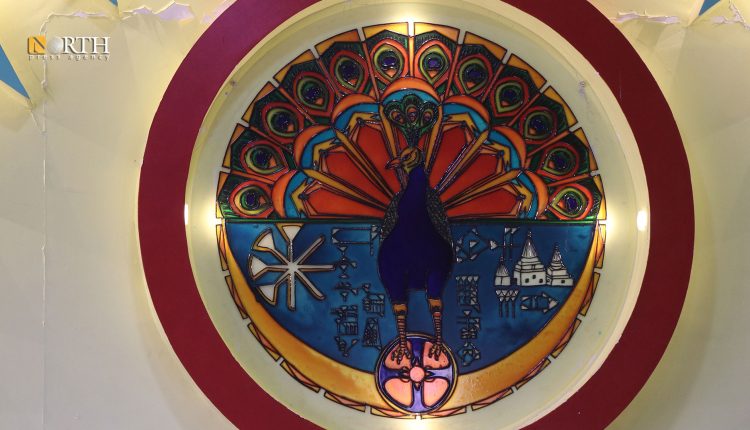By Dilsoz Youssef
HASAKAH, Syria (North Press) – After decades of marginalization, Yazidis in Syria are demanding official recognition of their faith in the new Syria to ensure inclusion and justice.
The demand at the April 26 Kurdish Unity Conference in the city of Qamishli, northeastern Syria, to recognize the Yazidi faith as an official religion in Syria has been met with widespread approval among Syrian Yazidis. They see it as a key step toward safeguarding their rights and affirming their identity.
Like many others, Yazidis in Syria—concentrated in the Hasakah Governorate, Aleppo, and its countryside—have endured systematic denial of their civil, social, and religious rights under successive Syrian regimes.
Paragraph Six of the conference’s final communiqué, which was endorsed by more than 400 Kurdish political and civic figures, calls for “state neutrality toward all religions and beliefs, the right to perform religious rites, and official recognition of the Yazidi faith.”
Some have pointed out a tension between that provision and Paragraph One of the same document, which states that “Syria is a multi-ethnic, multi-cultural, multi-religious, and multi-sectarian state whose constitution guarantees the rights of all its components on a supra-constitutional basis.”
Guarantee rights
Ismail Delf, co-chair of the Yazidi Council in northeastern Syria, told North Press that extensive discussions at the Kurdish conference addressed Yazidi rights after decades of oppression. He welcomed the inclusion of official recognition for their faith in the final communiqué and the promise of dialogue with Damascus.
“It is impossible for Yazidis to live freely without formal recognition,” Delf said. “Merely mentioning our religion in the constitution is not enough. We demand practical, on-the-ground guarantees in legal charters and everyday life.”
Historically, like Kurds in Syria, Yazidis were stripped of Syrian nationality and barred from freely practicing their beliefs. In 2021, the Syrian Ministry of Justice issued a decree forcing Yazidis to subject personal-status matters—such as marriage—to the general personal-status law, without the exemptions granted to Christians, Jews, and Druze. Those who resisted faced criminal penalties, sparking anger and resentment within the Yazidi community.
Since the start of Syria’s conflict, Yazidis have organized cultural and religious councils to preserve their heritage and identity. Delf noted that in areas run by the Autonomous Administration of North and East Syria (AANES), Yazidis now feel freer and have guaranteed representation— “a share protected by the social contract within the institutions.”
“We believe only a written constitution can safeguard our rights permanently,” he said. “A constitution would end injustice against Yazidis and protect all other faiths.”
Delf emphasized that Yazidism is a distinct religion, not simply a belief system to be subsumed under another faith. “Since the founding of modern Syria in the 1920s, Yazidis have contributed alongside all other communities to protect this homeland.”
One of world’s oldest religions
Kurdish politician Mohammed Ashraf Ali told North Press that although more than 120,000 prophets once appeared to organize humanity, only four Abrahamic religions have endured. “Other ancient faiths survived poorly documented and marginalized by history,” he said.
“Yazidism is one of those ancient religions,” Ali continued. “It faced backward prejudices and was never fully acknowledged for its family, religious, and communal rights. But now, after the Kurdish Unity conference, Kurds are demanding rights for Yazidis—a community with deep roots in the Middle East.”
Ali urged full protection and official recognition for Yazidi rights, noting that Yazidis have suffered 73 massacres throughout history. “We must end these atrocities and ensure Yazidis enjoy equal rights with other faiths,” he said.
He pointed out that the conference called for democracy, freedom, equality, and humanity without religious discrimination. “Yazidism must have a central place, and Yazidis should practice their rites freely and without hostility.”
Ali added that once Yazidi rights are enshrined in the constitution, they will remain protected no matter changes in leadership or regime. “Their history and religious freedoms will be preserved.”
An estimated 50,000 Yazidis lived in Syria as of 2014, mostly in Afrin, Aleppo countryside. Yazidi community leaders now estimate the number has halved—largely due to migration following attacks by Turkey and the Islamic State “ISIS”.
With the collapse of the al-Assad regime late 2024, Syrian Yazidis are hopeful that a new, inclusive Syria will emerge—one that guarantees the rights of all its citizens, regardless of ethnicity or religion.

